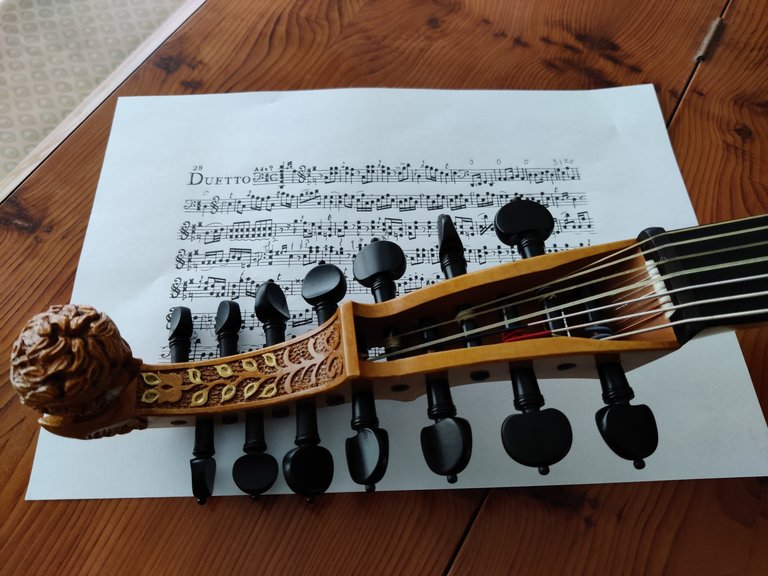Adagio from Duo for 2 Viola d'amore (Anton Huberty, 1722-1791)
Finally, I've got this first movement of the Huberty Viola d'amore duetto finished. Things are little slower when you are also dealing with kids at home! From needing extra time to help with the school or just general life, it can be hard to snatch an hour or two to practice and record a few takes of music... and then get the various parts together and ready to post!
Last time I wrote about this little task for this week, I had just finished recording the template for the Seconda part of the duo. From here, I just needed to record the Prima part and then put them together. However, I find that playing to a track over the headphones rather than a real live person to be quite tricky... it's easier when it is yourself on the headphones, but it is like having a conversation with a recorded message. To me, it feels stilted and strange... mechanical, as the flow of the conversation is already predetermined.
That said, that is what we have at the moment, with live concerts being mostly out of the question. Plus, it is something to keep my mind and fingers from fading away too much from lack of playing!
The Duetto is an interesting piece that uses the full 7 playing (and resonant strings) of my d'amore. It can be the case that pieces would be written for a 5 or 6 stringed instrument, which would mean that I would either have to avoid touching and using the lower strings or remove them completely. Either solution is a little bit flawed... removing them changes the tension balance across the instrument, resulting in strings that don't stay in tune on the treble end, a bridge that is being pulled off centre and different colour to the instrument due to the unbalanced tension across the whole sound board.
Avoiding the strings is also a tricky problem (but preferred for me...). Normally, it will be the bass strings that aren't required, which means that you can't apply too much weight into the lowest used string (in case it you accidentally strike a string that isn't supposed to be there). This can result in a performance that is a little bit on the careful side when you cross to the bass end of the instrument.
Alternatively, I sometime tune the bass strings to notes in the tonic or dominant chords... so that if I accidentally hit them, then at least they will be in the right chord (sometimes...). Or I can purposefully use them at the right moments and avoid the pretence of trying to dodge them all the time!
Thankfully, this duo is written for a full 7 string instrument! The chords at the beginning indicate a full D major spread across the 7 strings... so, no need to avoid or dodge strings! It means that the full range of the d'amore can be used, which is a nice feeling!
So, I hope you enjoy the result of the home recording... I'm not a fan of editing (plus, I'm not very good at it...), so I've tried to do the largest full takes possible. There are various blemishes... it's not the perfect studio recording or anything like that... but I really strongly believe that the recordings that are often released are nothing like the live performers that thye are supposed to represent! I prefer honest recordings where people aren't surprised by the difference between a live performance and a recorded one!
Now that this first movement is done, I have two more movements of this Duetto to learn and record... hopefully within the year!



Account banner by jimramones


View or trade
BEER.Hey @bengy, here is a little bit of
BEERfrom @pixresteemer for you. Enjoy it!Learn how to earn FREE BEER each day by staking your
BEER.Your post has been supported and upvoted from the Classical Music community (Subscribe at peakd and Steempeak) as it appears to be of interest to our community. We also support jazz and folk music posts!
If you enjoy our support of the #classical-music community, please consider a small upvote to help grow the support account!
You can find details about us below.
The classical music community at #classical-music, Peakd, Steempeak and Discord. Follow our community accounts @classical-music and @classical-radio or follow our curation trail (classical-radio) at Hive Vote or SteemAuto!